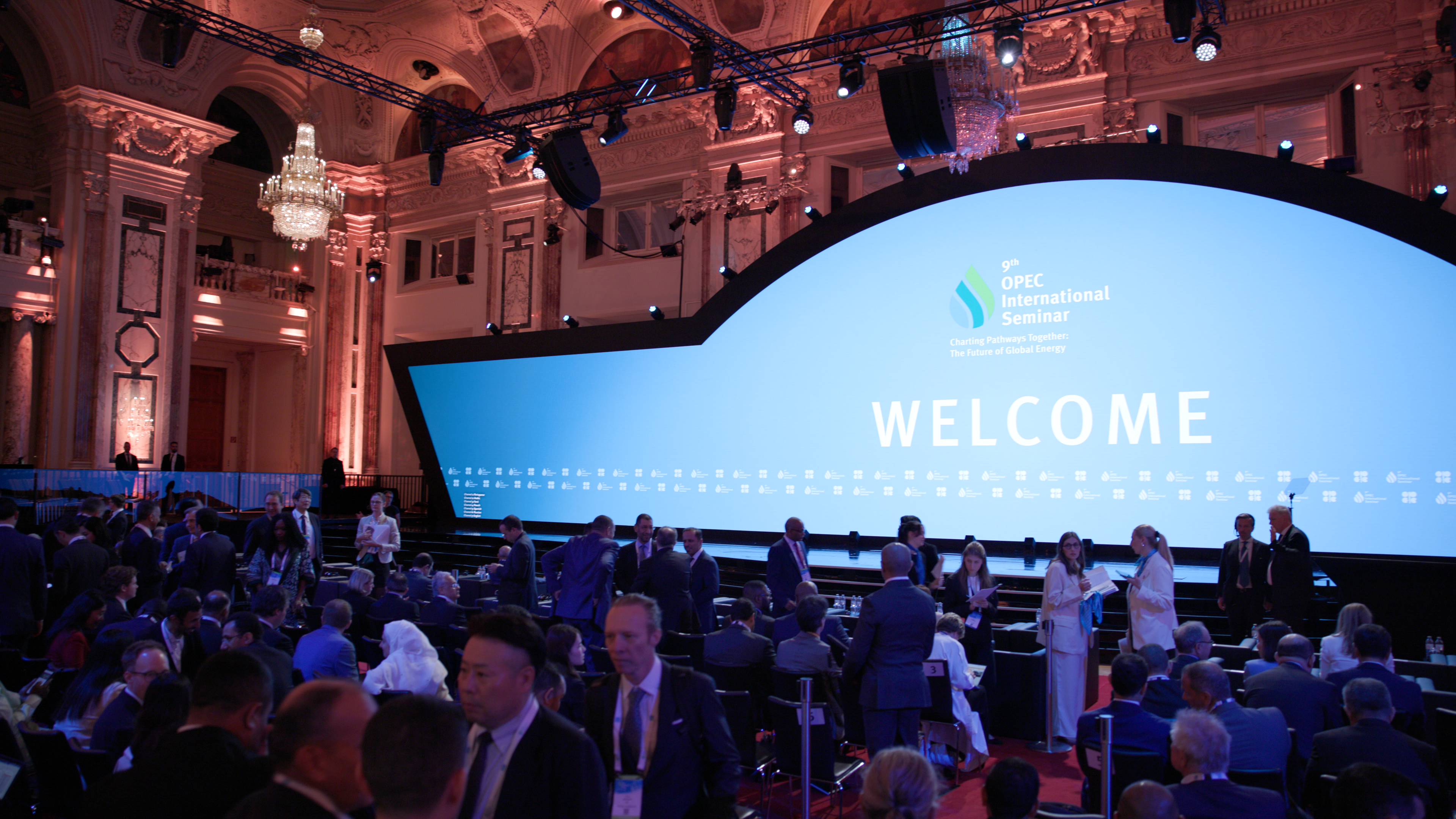OPEC's 9th Seminar opens in Vienna with calls for realism and energy cooperation
The 9th OPEC International Seminar opened today at the historic Hofburg Palace with a series of powerful statements from some of the world’s most influential energy leaders. The event, held under the theme ‘Charting pathways together: the future of global energy,’ drew ministers, policymakers, and executives from across the globe to engage in high-level dialogue about the challenges and opportunities facing the energy sector.
In his welcoming remarks, OPEC Secretary General HE Haitham Al Ghais set the tone by stating, “The question distinguished guests that our team seeks to address is how to strike a balance between achieving energy security, enhancing energy access, alleviating energy poverty around the world, while at the same time tackling and reducing emissions.” He noted that these concerns would be central to discussions over the coming days and underlined the importance of unity: “I’d like to stress all the words we used: charting pathways together.”
HE Al Ghais expressed gratitude to Austria for hosting OPEC’s headquarters for the past 60 years and marked 2025 as a milestone year, celebrating both the 65th anniversary of OPEC’s founding and the 60th anniversary of its presence in Vienna.
Following HE Al Ghais, HRH Prince Abdulaziz bin Salman bin Abdulaziz Al Saud, Minister of Energy of the Kingdom of Saudi Arabia and Chairman of the OPEC-non-OPEC Ministerial Meeting, warned that “the world will be sleepwalking into an energy crisis” if it fails to increase investment across all energy sources, including hydrocarbons. He called for a “flexible and pragmatic” approach to the energy transition, guided by “data, technology and acceptance of all sources of energy.”

Reflecting on global energy challenges, HRH Prince Abdulaziz said, “We really have to remember that nearly 1.2 billion people suffer from energy problems.” He questioned that figure, suggesting the actual number is much higher and emphasised the human cost of energy poverty. “If we can imagine that it can be done, I believe that the number will be roughly double.”
Highlighting the urgency of action, HRH stated, “A transition that does not help reduce poverty or improve energy access in developing nations will fail. The benefit of change must reach everyone.” He also called for global solidarity: “We live in one Earth, and the survival of everybody will rely on the survival of everybody too. Therefore, the transition must be inclusive and no one should be left behind.”
On Saudi Arabia’s role, HRH Prince Abdulaziz said, “For the Kingdom, [the energy transition] is an opportunity to lead innovation, investment and economic development.”
Meanwhile, HE Wolfgang Hattmannsdorfer, Federal Minister of Economy, Energy and Tourism of the Republic of Austria, welcomed delegates and expressed national pride in hosting OPEC for six decades. “We are very proud that OPEC decided 60 years ago to be headquartered in Austria,” he said.
HE described Vienna as a traditional hub of diplomacy and a place that fosters international dialogue through mutual respect. He called for an inclusive approach to energy planning, stressing that “only through respect we are able to connect and find common solutions.”
HE Hattmannsdorfer noted the rapid increase in global energy demand, stating, “According to the latest figures from the International Energy Agency, global energy demand grew faster than ever in the last year.” He highlighted the continuing importance of oil, saying, “Oil alone still accounts for around 30% of the world's energy supply,” and warned against ideology: “When it comes to securing our energy supply, we must act with pragmatism, not ideology.”
He concluded by calling for collective action based on science and evidence, stating, “We need all technologies, all sectors and all voices at the table if we want to succeed.”
Following the opening ceremony, the Seminar moved into its first ministerial session titled ‘Oil markets: energy security, growth and prosperity.’ The panelists included: HE Mohamed Arkab, Minister of State, Minister of Energy, Mines and Renewable Energies, People's Democratic Republic of Algeria, HE Tareq Sulieman Ahmed Al Roumi, Minister of OIl, State of Kuwait, HE Sen Heineken Lokpobiri, The Honourable Minister of State Petroleum Resources, Federal Republic of Nigeria, HE Suhail Mohamed Al Mazrouei, Minister of Energy and Infrastructure, UAE, HE Parviz Shahbazov, Minister of Energy, Republic of Azerbaijan, HE Shri Hardeep S Puri, Minister of Petroleum and Natural Gas, Republic of India, and HE Hon Alparslan Bayraktar, Minister of Energy and Natural Recourses, Republic of Turkey.
The session highlighted oil’s role as a foundational energy source, essential to industry, mobility, and daily life. It underscored the need for a stable and balanced oil market to ensure both energy security and economic prosperity.
The 9th OPEC International Seminar resumes on 10 July with sessions dedicated to energy investment, sustainable finance, regulatory frameworks, and the evolving priorities of developing economies.
Since its inception in 1969, the Seminar has grown into one of the energy sector’s most influential platforms. Relaunched as a recurring event in 2001, it has played an important role in shaping global energy policy, strengthening cooperation between producers and consumers, and confronting the sector’s most urgent challenges.
With the launch of the World Oil Outlook 2025 and a packed agenda of high-level dialogue, this year’s Seminar is set to help steer the course of global energy strategy for years to come.





